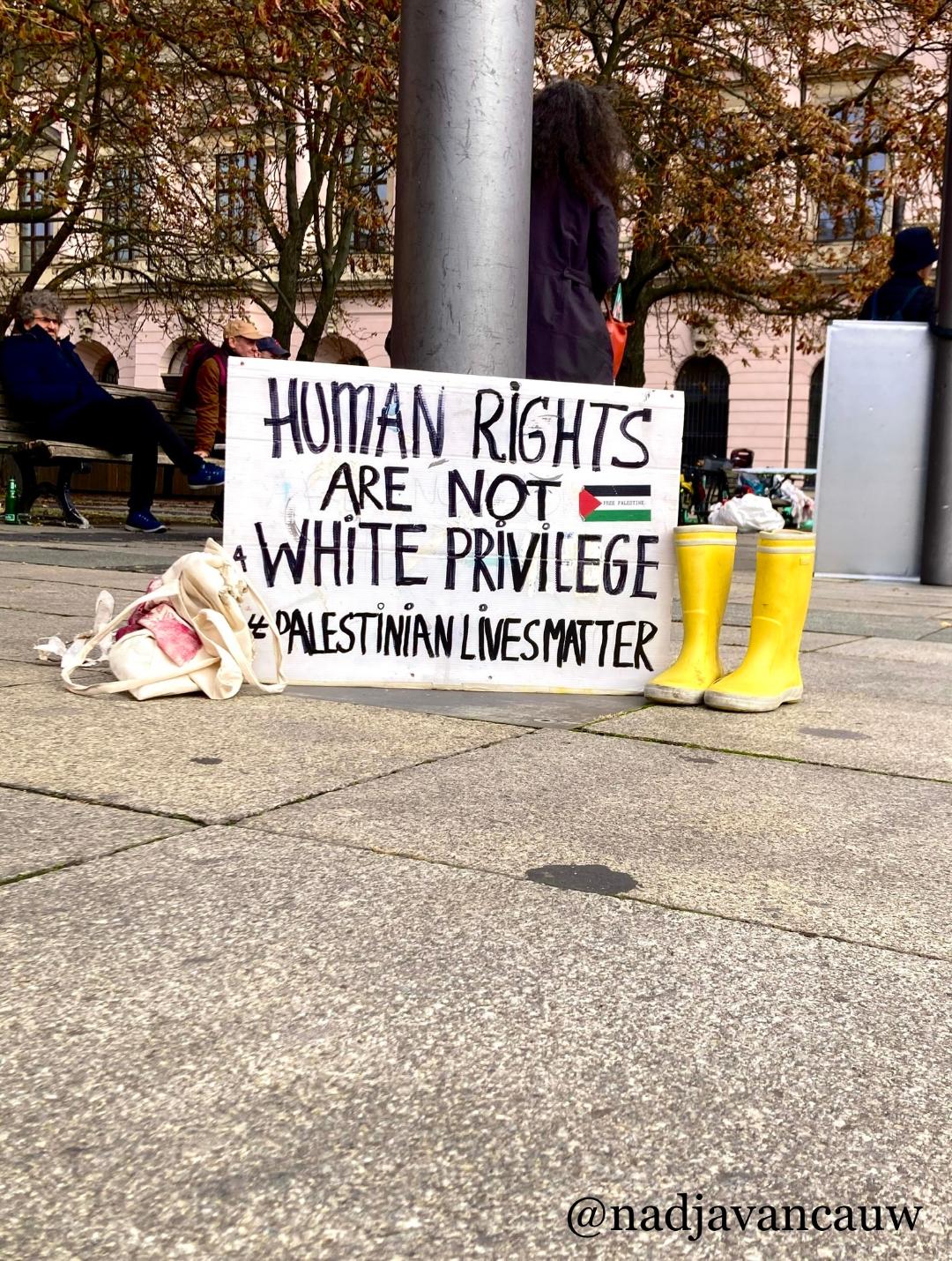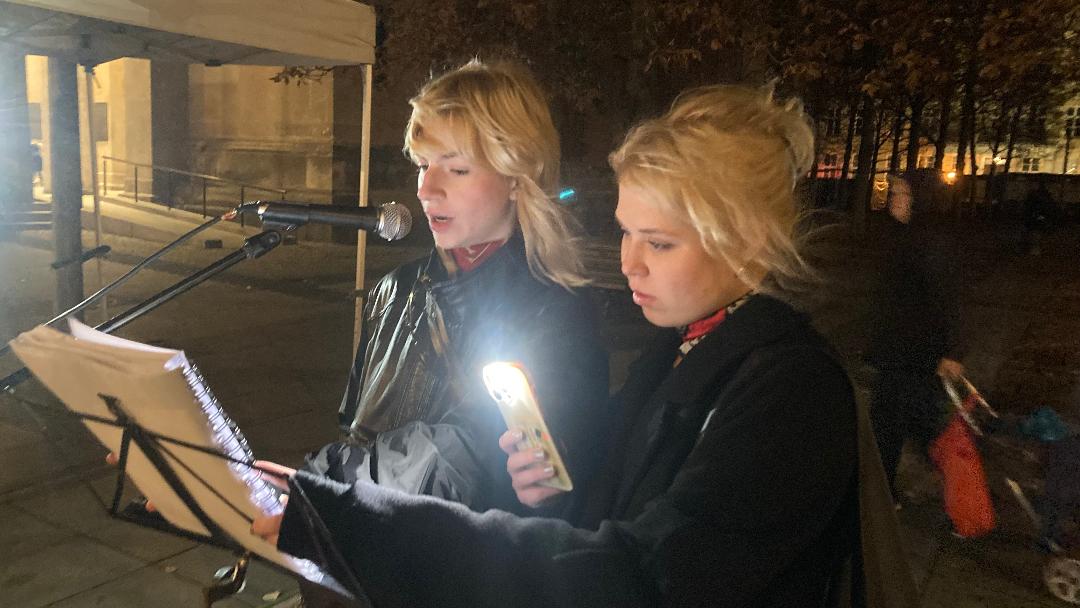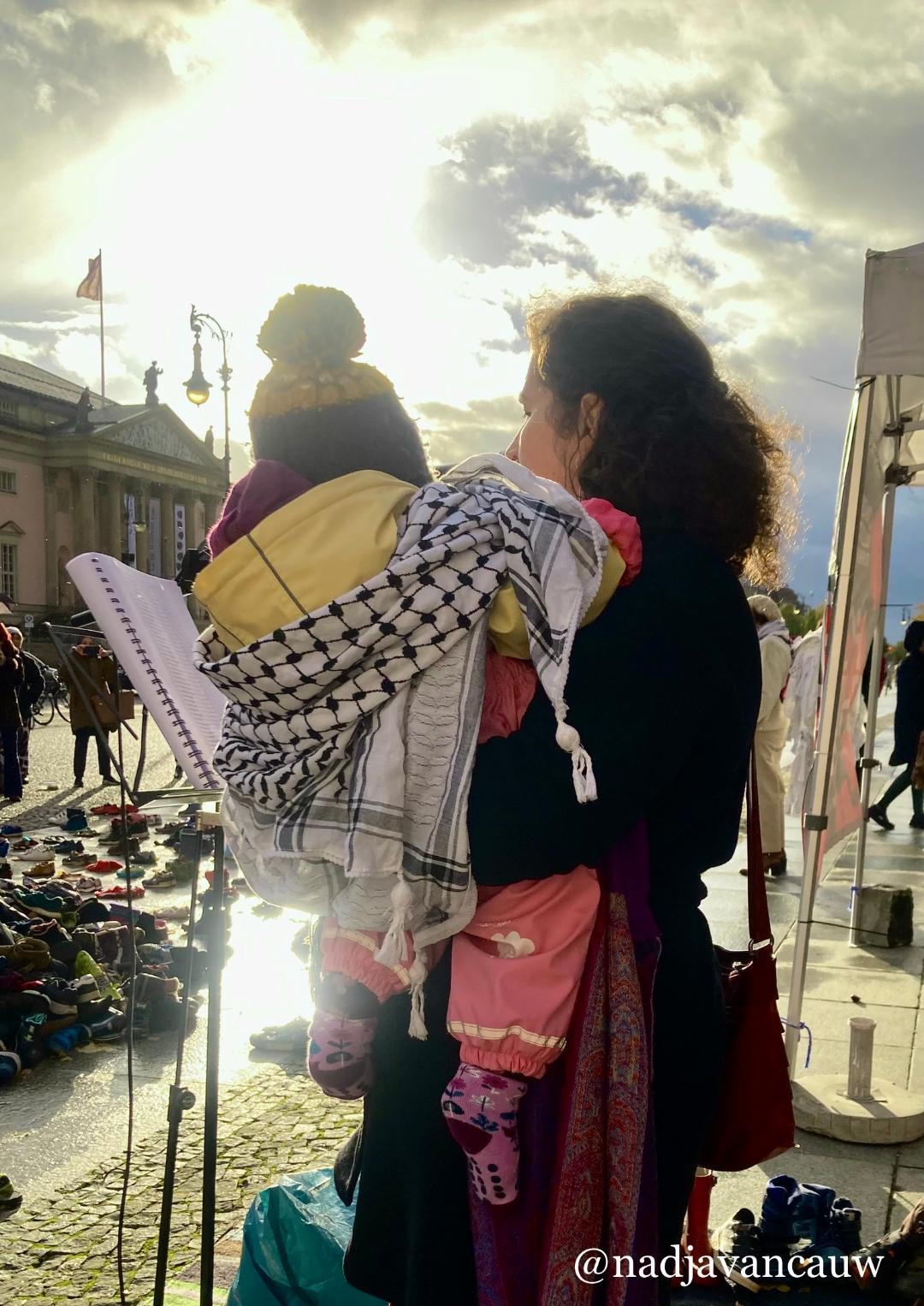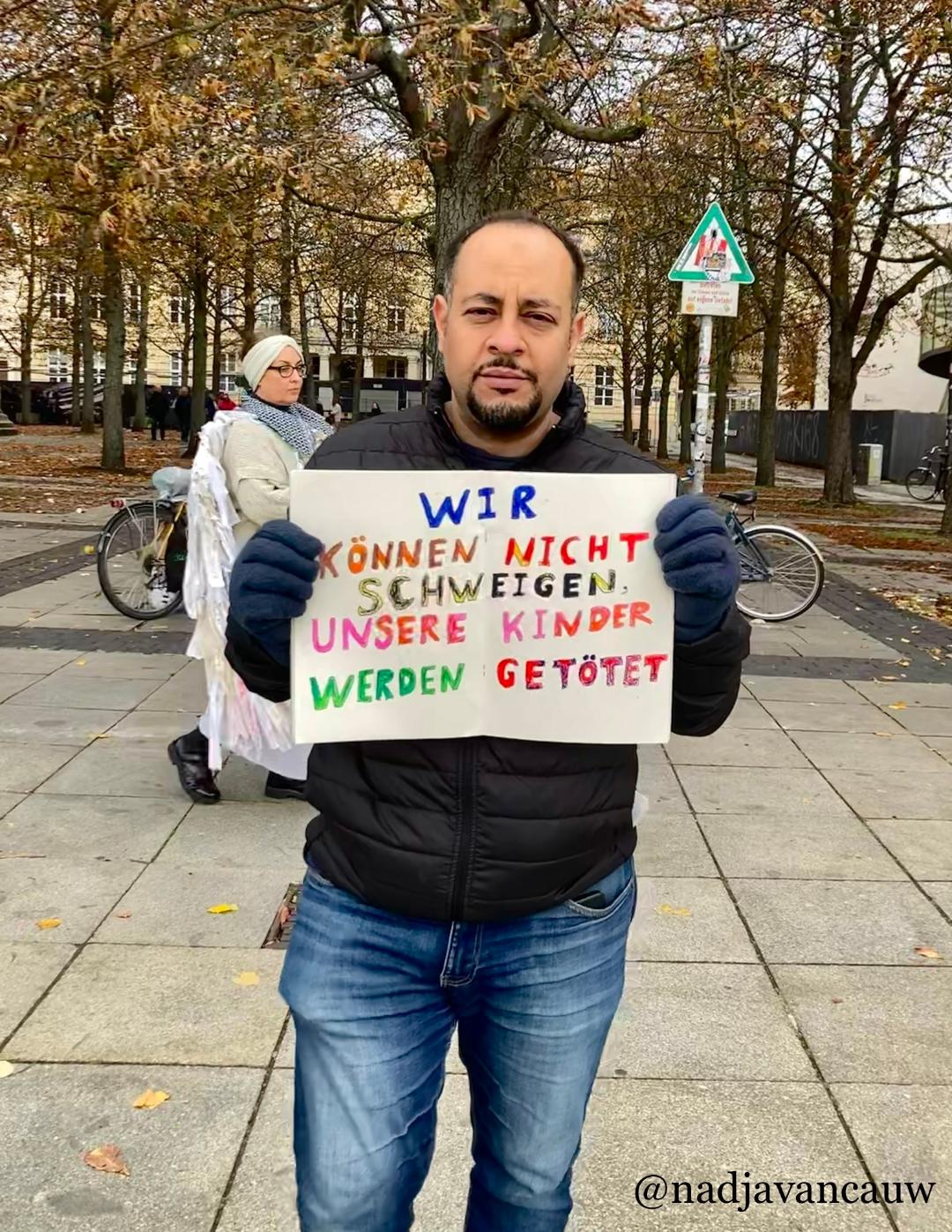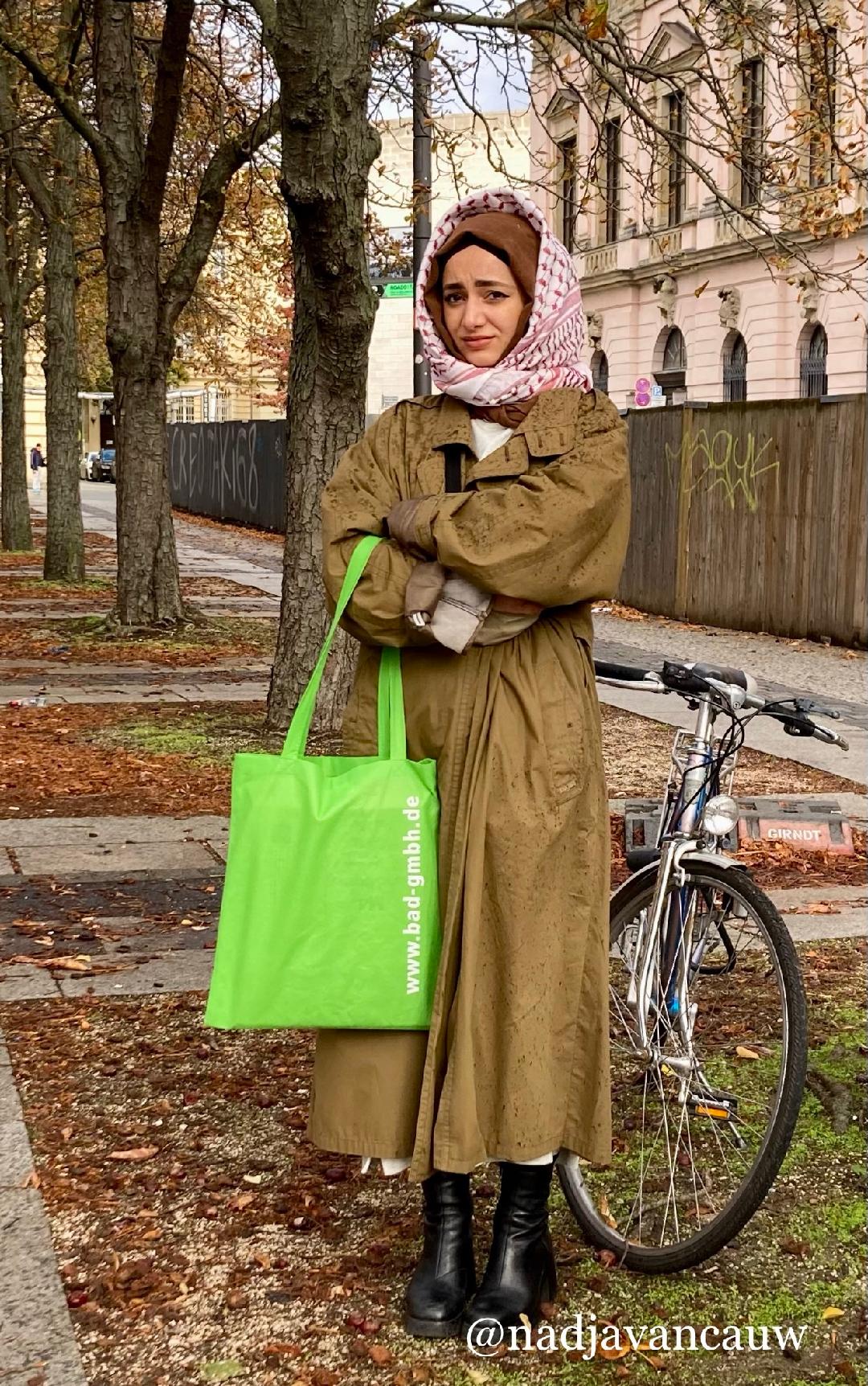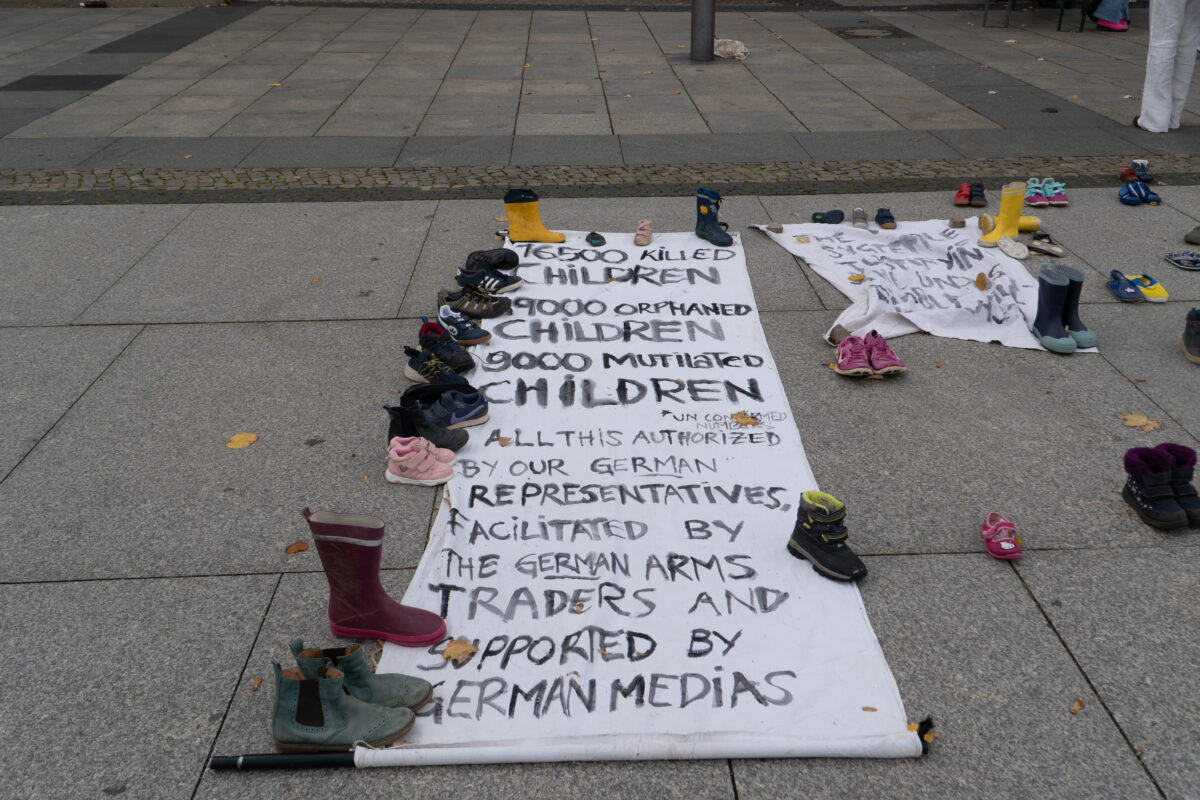It’s a windy Sunday on Unter den Linden. Yet, an eclectic gathering of people – 600 in total over the day – is standing still on the pavement next to a heap of used children’s shoes outside Berlin’s Neue Wache, the city’s memorial for the “Victims of War and Tyranny.” Every four minutes, one of them walks up to a microphone and reads one page of 42-45 Arabic names, surrounded by more kids’ shoes. There are women dressed in giant white wings among the listeners. No speeches, no music. Not a political slogan in sight.
“We’re reading the names of the children killed in Gaza,” I tell a German tour guide, obviously struggling to explain the scene to her bemused flock. The giant English sign reading “HONOURING THE CHILDREN OF GAZA” doesn’t seem to help. Neither does the eclectic collection of people of all ages, ethnicities, and appearances. Except maybe for the odd keffiyeh, this is a crowd that doesn’t easily give itself away. “Ah, a pop-up for English people,” she concludes before fleeing the scene, her 17 tourists in tow.
Anyone who’s done it knows what it feels like to speak those names aloud. On that Sunday, the emotion and dignity we all felt were humbling.
It’s October 13, and Israel’s war on Gaza has claimed the lives of at least 17,000 children. In June, we’d already “honoured” 8,000 of them over a 15-hour marathon reading. We didn’t think that just five months later, we’d be here again. This time we only have 10 hours and we already know we won’t even get close to getting through the next batch of 8,000 names we have prepared. But the emotion is the same. Anyone who’s done it knows what it feels like to speak those names aloud. On that Sunday, the emotion and dignity we all felt were humbling.
Meet the Readers: a snapshot of Berlin‘s International Palästina Solidarity
By 8pm we’re slowly packing up as an 11-year-old keeps on reading names – many of the names she reads are her age or younger – with undeterred determination. Before her, 128 people have read one page each. Despite the wind and the damp cold, an uninterrupted flow of volunteers has flocked to the Neue Wache. They’ve come alone, with partners, children, friends, or dogs. From 1pm the waiting time for a reading slot was about 40 minutes, but even when the rain started, no one thought of complaining. A Palestinian woman asked if her mum could read her own list – they have (had?) family in Gaza. A man insists on reading a second and a third time. When not at the mic, he stood by with an open notebook covered in colourful childish letters, which reads: “Wir können nicht schweigen, unsere Kinder werden getötet” (“We cannot be silent, our children are being killed”).
Our readers reflect both Berlin’s multinational demographics and the world’s politics: they’re from Mexico or Russia, India, Japan, Egypt, or Lebanon to name a few I talked to. And there are many Irish Berliners, like Cara who’s come with three boxes of beautiful home-printed stickers of our trademark poppies. Judging by today’s turnout, Irish Berliners are in step with their country’s strong empathy for the Palestinian liberation fight. “We had our share of colonial oppression, scars are still there,” says a young woman from Dublin. “Solidarity for us isn’t just words, we feel it in our guts.” If I was familiar with Ireland’s inclinations (the country formally recognised the state of Palestine in May), I knew little about Latvian politics until a tourist from Riga walked up to us with great excitement. “In my city they ban protests in support of Palestinians,” he explained, making it sound like things couldn’t possibly be worse elsewhere. He’s obviously very moved by our event.
As in June, many Jews, expat Israelis, and Germans with Jewish roots have joined in – like the violinist Michael Barenboim, who rushed from Hauptbahnhof to make his 12:30 slot. The son of legendary Jewish peace-building conductor Daniel Barenboim, Michael is one of Germany’s few prominent voices to have protested the war in Gaza in any media that would hear it. His outspokenness, humble availability (he’s also a co-initiator of the Kilmé Palestinian talks series), and his natural eloquence (“It’s not the Palestinians’ fault that Germany murdered six million Jews”) have made him a hero among Berlin’s thriving pro-Palestine milieus. Despite a packed schedule that week, and a concert in Marburg the previous night, he insisted on reading with us again. “I was already here in June, and I thought this event, mourning together, was a really moving and powerful way to show solidarity. You stand here at the mic, with one page of this thick book filled with lists of names. You read the name and then you read the age – so many of them are under one, or two, or five… It’s just heartbreaking.” I also recognise Mehmed König among the crowd. This time around, the Berlin SPDMP isn’t reading. He, his husband and their dog Oscar have come simply to show their support.
Meet the Germans: much shame and more guilt
More surprisingly for people familiar with the political context here, many white Germans have made their way to the Neue Wache. They all talk about the collective shame they feel at their country’s “unconditional” support of Israel, and the bitter feeling of being “on the wrong side of history again.” Cornelia, who’s travelled all the way from the South of Germany to read, is deeply emotional about the topic. “I think that as Germans, especially because of your country’s history, you have a responsibility to speak up for the Palestinians as well as for the Jews. A double responsibility, because without the Holocaust, the massive immigration of the 1930s, and the Nakba, the expulsion of 750,000 Palestinians from their homeland in 1948, we wouldn’t be where we are now.” Her paternal grandparents were Jewish musicians from Hungary. “If it weren’t for one brave man who, in the hell of the Holocaust, rescued the lives of over 100,000 Jews in Budapest, I probably wouldn’t be here today. So I think it’s important to stand up for humanity, and now we live in a democracy, it’s our duty to do so.”
Although she’s a German citizen and spent most of her life in Baden-Württemberg, Cornelia won’t say “we” when speaking about Germany. She also won’t associate with “her” Green Party anymore – not when a Green foreign minister’s support for “Israel’s right to self-defence” means excusing and abetting the killing of over 42,000 civilians. This tireless peace advocate struggles with her natural mildness when referring to Baerbock’s speech in the Bundestag a few days earlier, when the minister condoned the targeting of hospitals and schools (In Baerbock’s words, “I made clear that civilian sites could lose their protected status if terrorists abuse this status. That’s what Germany stands for.”).
There are many former East Germans here too, like Katja, who grew up in Dresden and is angry with her fellow citizens. “How can you go demonstrating for diversity, equality, against the AfD, but fall silent when faced with this slaughter committed by a far-right government?” Katja is the initiator of Stimmen aus Gaza, a group of 20 women (and one man!) who, since February, have been reading poetry and diaries from Gaza on streets and squares around Berlin. Their small pop-ups are often met with indifference and sometimes verbal abuse. “But some people do stop and listen, and it means a lot.” For Katja, speaking out is key. “In my circle, I sense a terrible fear of coming into contact with the issue.”
Today, Claire has joined in with a 16-strong bevy of Grieving Doves . Since last October, they’ve been a regular sight at Berlin pro-Palestine demos and self-organised mourning convoys across the city – carrying spectacular wings made out of the names of Gaza victims, which they handwrite on pieces of cloth at monthly workshops. Doves and Stimmen have been natural matches for an event aiming to promote grieving as a way of breaking the silence.
Beyond denial?
“It’s good you’re doing it for the children – they are innocent victims,” concedes a neighbour who only came after I explained there would be no political slogans, no speeches. She was especially concerned with being seen next to a banner with “From the river to the Sea,” a slogan that was ruled to be a crime by a Berlin judge.
German minds may be out of reach, but their hearts aren’t. At least this is the bet we made.
I like to joke that with HTCOG we created a space for Germans to break the silence, without having to speak out. The idea? Shaking off apathy by means of empathy, and winning over a few bystanders, by helping them out of their comfortable denial zone. Sami Khatib, a scholar who doesn’t mince his words about “Germany’s Palestinian problem,” was sceptical of my theory, arguing that, yes, even if they come and feel sorry those kids, they may still share the widespread idea in Germany that if those children have died, it’s the Palestinians’ own fault – for wanting to fight Israel, or having Hamas “hide behind civilians”(2). I take the point, but I still would defend that mourning Gaza’s children is one step out of the kind of dehumanisation that underlies any genocide. German minds may be out of reach, but their hearts aren’t. At least this is the bet we made.
I’ve since realised that even an event mourning children can be viewed with suspicion, after a former friend and colleague accused me of spreading “hatred of Jews in Germany.”
I’ve since realised that even an event mourning children can be viewed with suspicion, after a former friend and colleague accused me of spreading “hatred of Jews in Germany.” I had invited her to come and read the list of the 37 victims under 18 killed by Hamas on October 7. (They were mostly Jewish, but include six Bedouins.) She declined, arguing that she “would not expose herself to being beaten to death.” Since then she’s been sending me material “debunking Palestinian lies,” including a 6-minute video “proving the Gaza death toll is faked” – making our HTCOG event part of a massive Jew-hating propaganda effort.
Let’s face it: most of us who’ve gathered at the Neue Wache would be “antisemites” not only according to my friend, but also by German State standards. whose blurry IHRA definition of antisemitism tends to extend to critics of Israel.
But I knew we’d struck a chord in the last instalment of HTCOG when my German ex-Stiefmutter agreed to join in and read last June. In a moving video, she spoke about the trauma of her post-Holocaust generation. “We, the perpetrators’ children” struggle to break the silence, the unbearable realisation that “nothing, no one, could undo what had been done.” Now, her uneasiness seeing fellow Germans turning their eyes and hearts away from the extermination of so many Palestinians. She didn’t come this time. I put it on the weather.
Interestingly, white men were the missing demographics on both of our events, unless they were Jewish or of “Migrationshintergrund.”
Are other German men lacking a wife, balls, or empathy?
So when a tall German in a suit and tie walks up to the mic, he causes a bit of a sensation. I then realise he’s come with his young Iranian wife and her mother to read. Cherchez la femme. Are other German men lacking a wife, balls, or empathy?
Meet the elusive journalists
It’s not yet noon when a reporter from Turkish TRT World shows up, a cameraman in tow. They were already here last time – probably the only local outlet to report on “pro-Palestinian” events in this country. To be fair, a few German colleagues did cover the June event, like Daniel Baiz and Charlotte Wiedemann, who both wrote about us in taz – notable exceptions for a paper that won’t dare criticise Israel despite their supposed left-wing, progressive and (until Ukraine) pacifist, credentials.
One French journalist has made the round trip from Paris to read his page of names. He’s a retired celebrity of French public television, from back when TV news journalists were fearless front-line reporters, and their faces familiar to every household. “Most media in France seem indifferent to the number of people killed every day in Gaza,” he says “Reading their names is a great idea.” Like many press veterans of his generation, he laments the failure of big Western media, staffed by what he calls “content-makers” rather than reporters. Today, he mostly relies on Al-Jazeera and social media to know “what’s really going on” in Palestine. “But I’ve heard the situation is a lot worse with German media. Is it true?”
Why honour the Children of Gaza in Berlin?
Where to start? The natural distress any human would/should feel when faced with the live-streamed spectacle of so many butchered innocent souls? “Souls,” not numbers, not disposable bodies in the way of the IDF’s war rampage.
Then the indignation we felt when Berlin, our city, home to Europe’s largest Palestinian diaspora, banned and repressed expressions of mourning and solidarity for Gaza victims. Judith Butler’s division of populations into grievable and ungrievable lives had never felt so close to home. According to German society, Palestinian children were obviously not as grievable as Israeli ones. Certainly not as grievable as our own white ones.
This was of course exacerbated by the frustration of living in a country where criticism of Israel was inaudible, unacceptable and often labelled as “antisemitic,” Where your progressive friends would hide behind abstract concepts (“Staatsräson” anyone?) and plead “overcomplexity” to excuse appalling ignorance and political passivity. A country where media silence made ignorance excusable and mass murder something that could simply be overlooked. In the words of Charlotte Wiedemann, “a special German right not to know – not to know what exactly is going on in Israel, in Gaza or in the West Bank because knowing would be too difficult.”
A whole nation’s support for a genocide* in the name of atoning for a past one? (*I leave the semantic debate to specialists – let’s just point out that the ICJ ruled “genocide” as “plausible”). The moral flaw of this reasoning is so obvious that the German blindness to recognise it – even when challenged by Jews – reveals an Erinnerungskultur that has been completely warped.
By tying atonement to its support for a foreign state supposed to represent its former victims, Germany, the great perpetrator, is turning its “Nie wieder” commitment into a political catechism, not a moral principle. Insightful minds have described a perverse expiation mechanism by which Germany had “subcontracted blame” to the Palestinians – they were now paying the German debt.
Meanwhile, the entire German media apparatus has succumbed to a baffling travesty of journalism by which context has been erased, facts redacted, and sources selected, so as to perpetuate a narrative in step with “Staatsräson.” Individual colleagues complained to me about “the pressure” but very few dared to dissent. I got a taste of the situation already last November, when taz asked me to write an opinion piece about my “outsider’s perspective,” which they ultimately did not publish after weeks of procrastination. “I agree with everything you write,” said one editor. But? “Timing,” she replied. The piece was entitled, “Why won’t my German friends and colleagues speak out against Israel’s war crimes in Gaza?”
By early April, some 10,000 children had already died in Gaza, but Germany was turning its eyes away: Politicians were busy fulfilling Staaträson with more weapons shipments to Israel and the disbanding of a Berlin-Palestinian symposium, while the German media were working hard reporting on secret Hamas tunnels in Gaza and outing hidden antisemites at home. That’s when Lucie, a Frenchwoman who owns a café-grocery store in my neighbourhood told me about a bunch of enterprising Dutch people who had displayed shoes on Utrecht’s city square and read the names of the children of Gaza. When she asked me if I would be up for organising something similar here, I immediately jumped on board. We contacted the Dutch organisation who agreed to send us all the names they had received from the Gaza Health Ministry and translated into a bilingual script. (1)
Who are we?
We often laugh when people ask about the “organisation behind this” – considering we started as a trio and continued as a pair of French Berlinerinnen, using the label “independent initiative.” Lucie’s husband is Palestinian, and her three daughters have grandparents in the West Bank. Nouma, who helped us organise the June event, has an Algerian dad. I’m not Jewish (many friends as well as my mum’s partner are). I’m not Arabic or even Muslim (some old friends are). I’m not German either (my daughter is). I’m a journalist who once spent 10 days seeing another tragic war (2001, Chechnya). There, I witnessed what it means to lose everything – a home and loved ones, and the grief of one particular mother never left my heart. Those 10 days in war-torn Chechnya taught me that no political goal can ever justify the killing of a single child. That wars are mostly decided by people who don’t fight in them. That civilians never win them.
And so we took action, and tried to enrol some “bystanders.” Between June and October, up to 900 people dropped by the Neue Wache to honour the children of Gaza. Strangely, neither Lucie nor I read. Why? “Not my thing,” says Lucie, whose quiet, collected mompreneur facade (she cares for a two-shop business and three daughters) hides great shyness and a big heart. I can relate. I’d tried, alone in my living room, as I needed to time how quickly one could read a page. After a few names, the words got stuck in my throat, and I was overwhelmed by a deep emotion, the same emotion I saw again and again outside the Neue Wache that Sunday.
Notes
(1) COUNTING THE DEAD According to official counts, between 16,500 and 17,000 children have been killed in Gaza alone, since October 2023. Serious experts say it’s a lot more than that. We know from previous experience that numbers end up being 3 to 15 times higher once you include unreported and indirect deaths (Lancet)
(2) We now know from American doctors who reported to the NYT “what they saw in Gaza,” that many children don’t die as “collateral damage” during airstrikes – but murdered in cold blood, shot in the head.
Photo Gallery from the Event by Cherry Adam
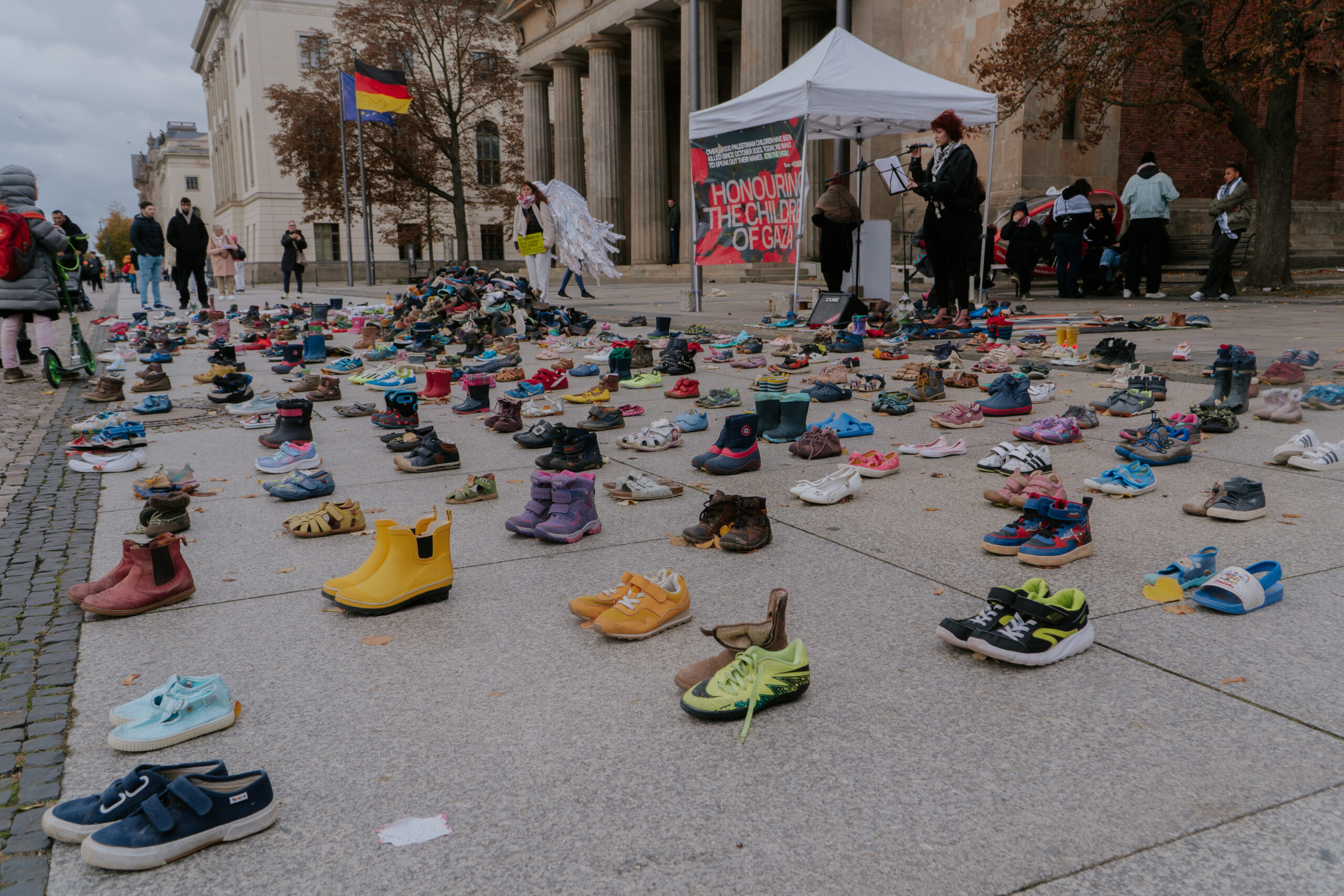
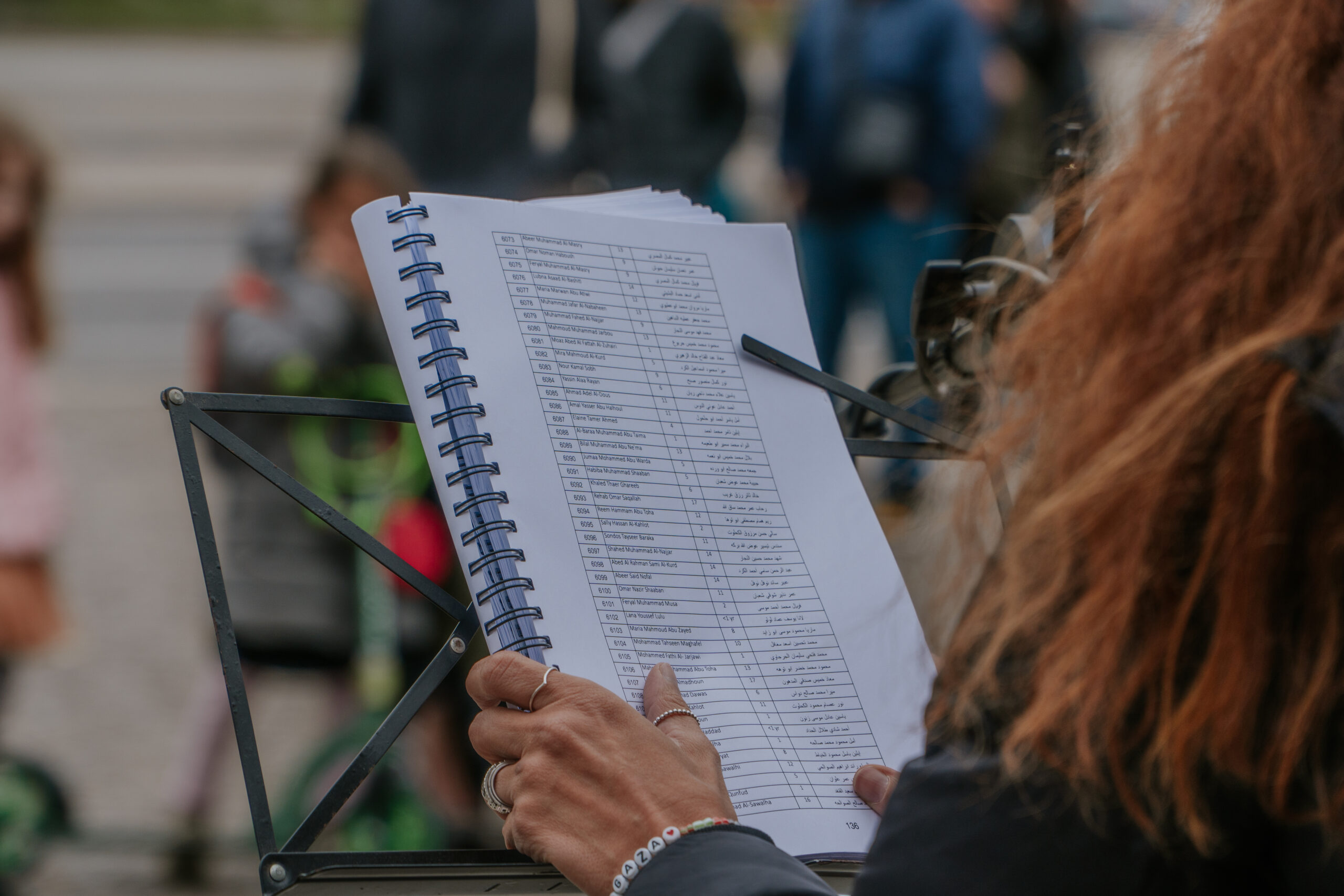
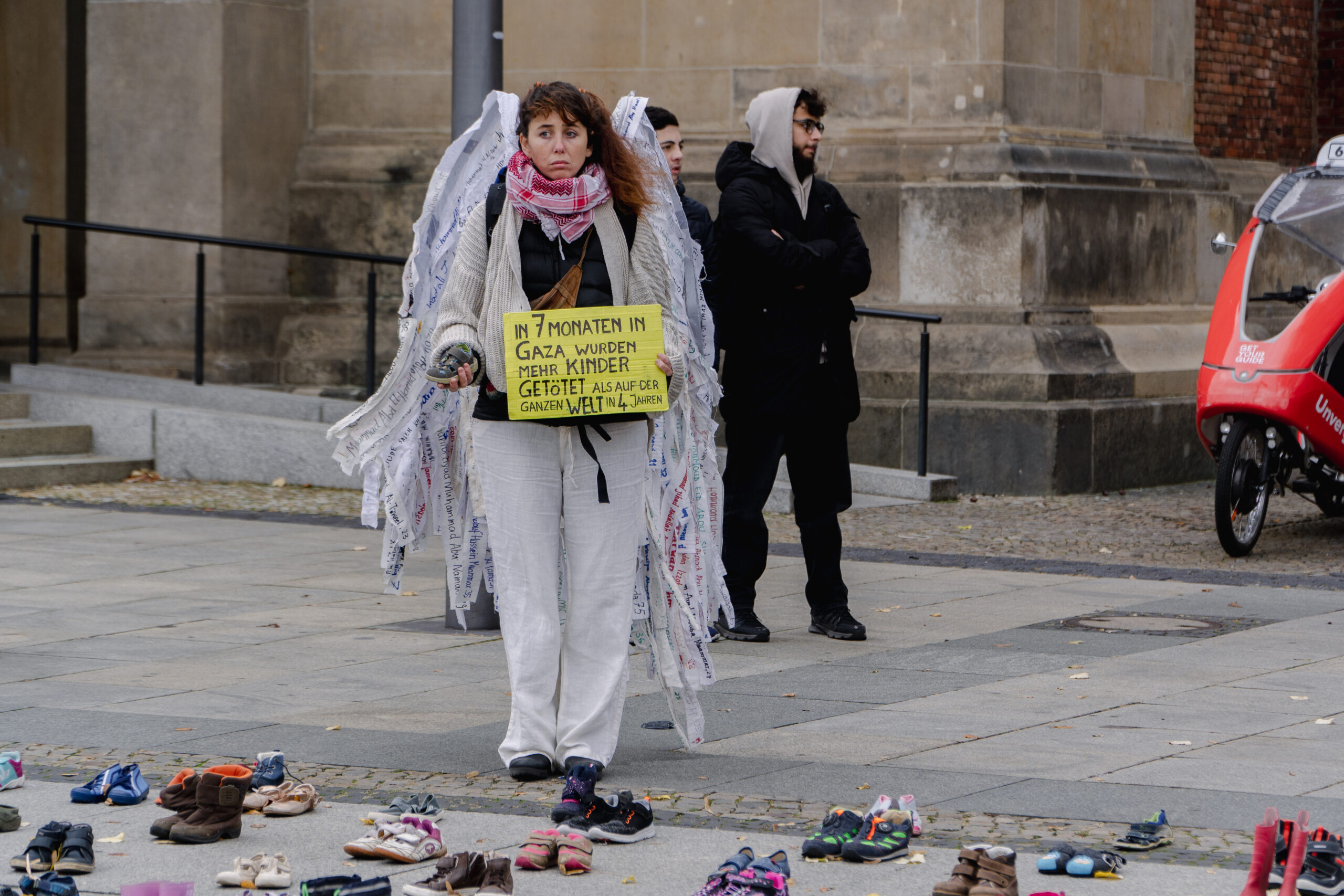
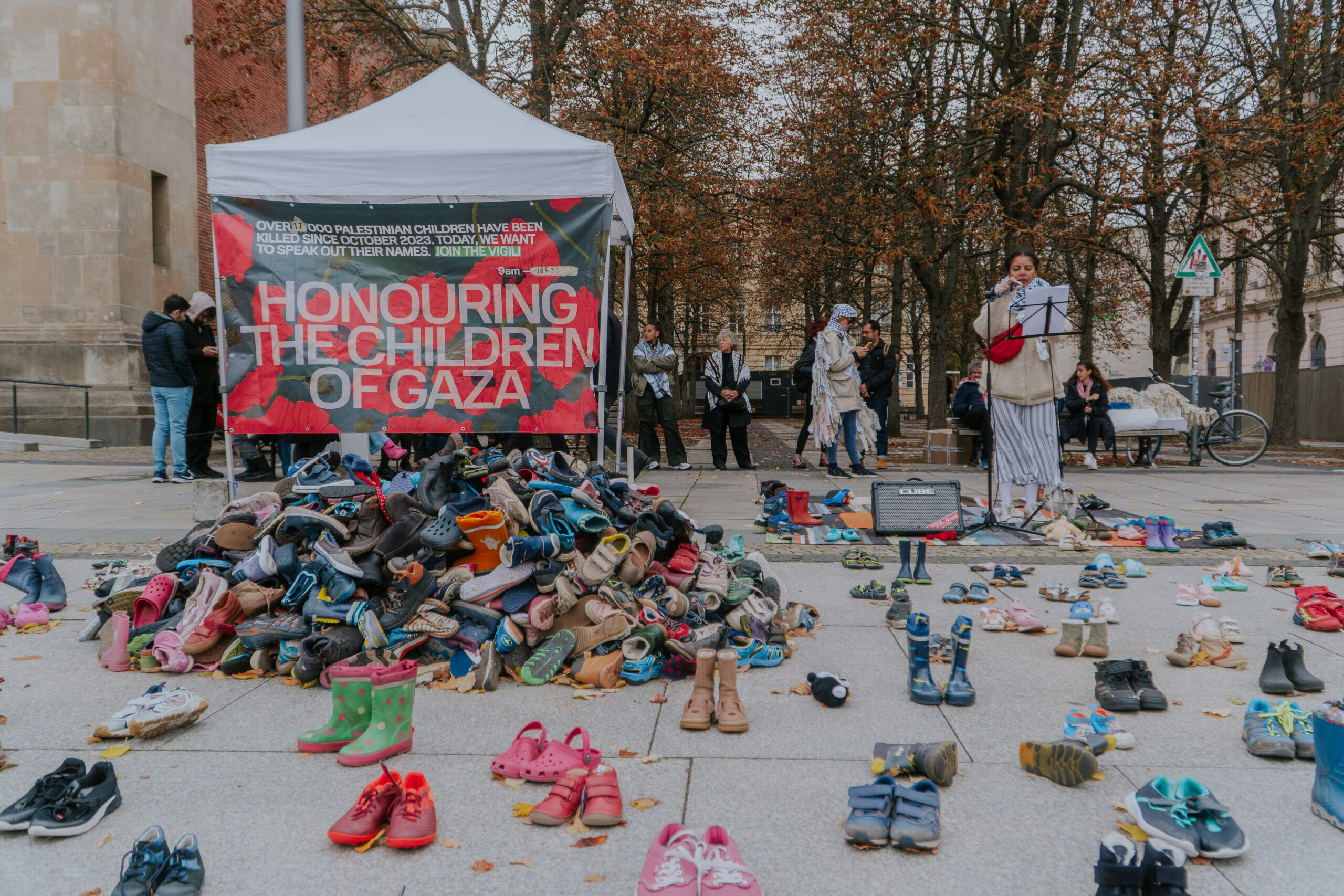
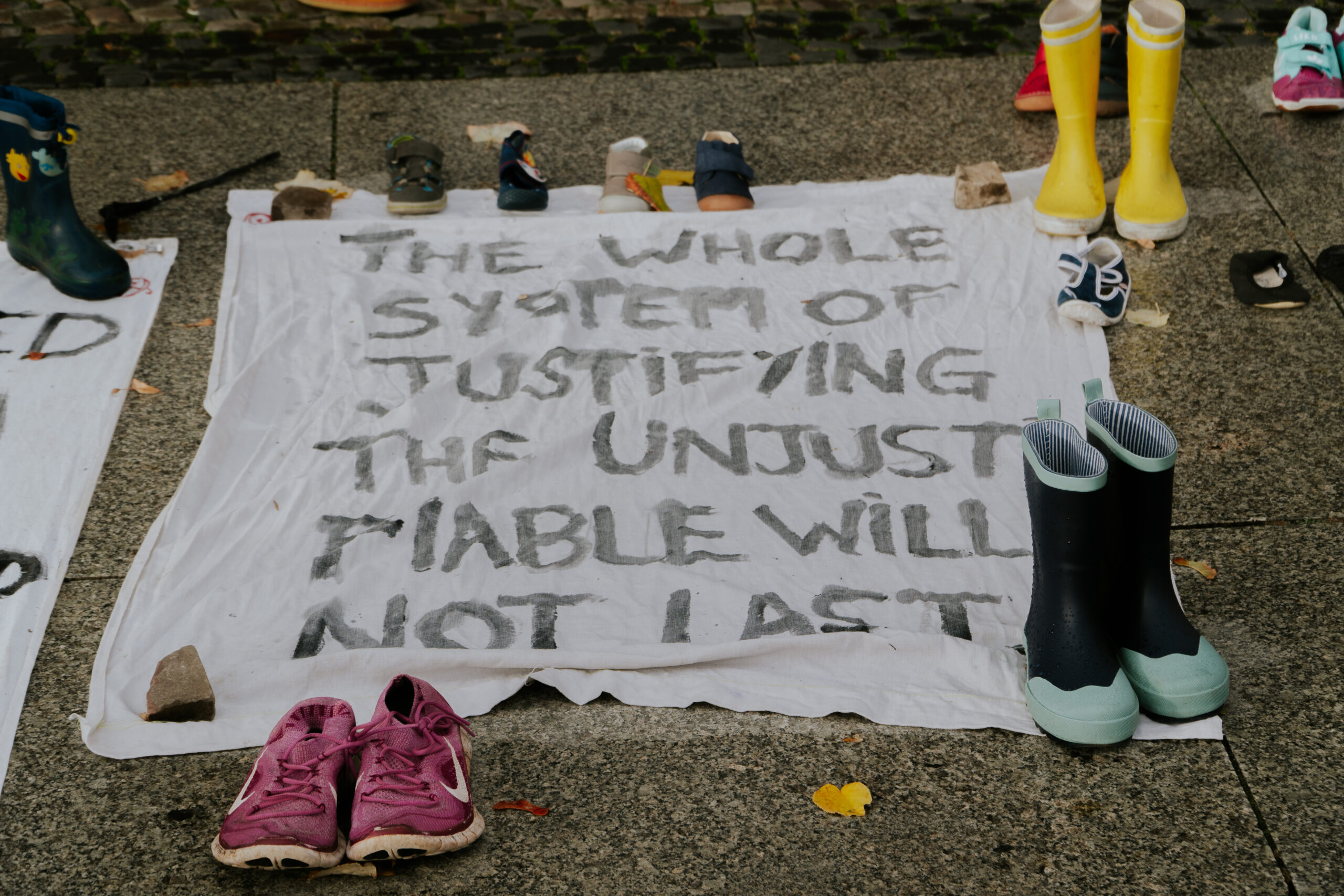
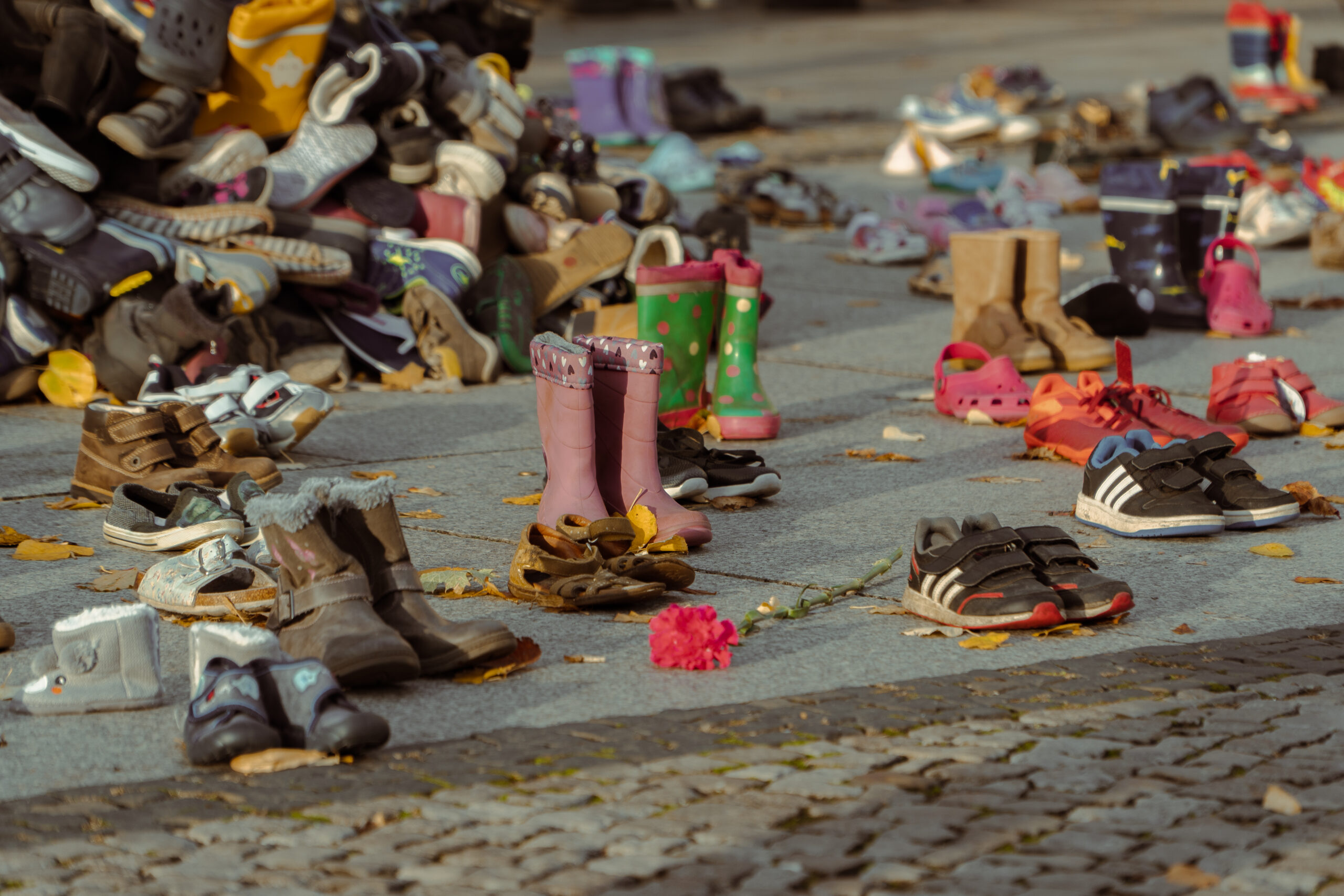
Photos by Nadja Vancauwenberghe
